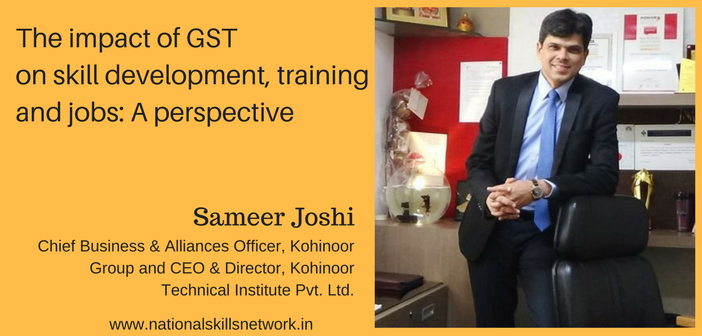We have just witnessed a historic moment when Goods and Service Tax (GST) was launched in the midnight session of Parliament on 1st July 2017. GST rollout is a massive step in bringing in One-Nation, One-Tax regime. Post roll-out, there will be a high demand for many professionals with knowledge and skills in GST implementation. Hence, there is a need to complement GST implementation with appropriate training and skill development in relevant industry sectors.
This move is going to be a game changer in India’s economic activity both in creating job opportunities and boosting further education sector. In this guest article Sameer Joshi, Chief Business & Alliances Officer, Kohinoor Group and CEO & Director, Kohinoor Technical Institute Pvt. Ltd. shares his opinion and puts forth his perspective on how GST will have a positive impact on job creation and the need for skilled workforce to fulfill new job roles.
How skilled workforce can ease transition to GST
India’s corporate sector is engaged today in aligning their financial and accounting systems under this new regime. And to achieve the same, it needs a specialized workforce across accounting systems, legal compliances, taxation and data analysis. This is where huge demand of professionals exists. So, from employment perspective, there is huge potential that can be seen under two phases – immediate boost for implementing GST across business sectors and then a steady state demand for ongoing activities going forward.
In fact, some of the renowned staffing agencies have predicted an annual growth to the tune of 10-13% in the formal job creation because of GST. As per market sources, sector-wise, the immediate high impact segments of this regime are expected to be e-commerce, BFSI, Consumer durables, auto sector, media and entertainment, hospitality, pharmaceutical and telecom. Of course, criticality remains on infrastructure and achieving transition mitigation modalities in time.
 GST’s impact on education sector
GST’s impact on education sector
Education continues to be of utmost importance for the country’s economic growth, it also has been a priority for the Government in extending tax benefits and other concessions to boost education (both primary and professional / technical) in the country. Education in India is presently covered as one of the priorities of the Government and as such is allowed tax relief both in direct and indirect taxes.
Skill development initiatives to continue with Service Tax Exemptions under GST
As per government notification under title Service Tax Exemptions to be continued in GST as decided by GST Council confirms –
Any services provided by (i) the National Skill Development Corporation set up by the Government of India; (ii) a Sector Skill Council approved by the National Skill Development Corporation; (iii) an assessment agency approved by the Sector Skill Council or the National Skill Development Corporation; (iv) a training partner approved by the National Skill Development Corporation or the Sector Skill Council in relation to
- (a) the National Skill Development Programme implemented by the National Skill Development Corporation; or
- (b) a vocational skill development course under the National Skill Certification and Monetary Reward Scheme; or
- (c) any other Scheme implemented by the National Skill Development Corporation.
This means government’s key focus on Skill India mission will further boost vocational education and training under this new regime to create more skilled work force. It’ll be a great opportunity for Training Partners to create short term certificate programs under BFSI category on GST to attract young people to enroll, get skilled on GST which has a good employment potential as mentioned above.













It also means that every training agency should run government funded courses only to avail benefit of GST exemption.
If a person from economically poor family wish to join a skill training program which is not funded under any government scheme, have to pay 18% GST to the training agency over and above basic training fee.
Isn’t it ?
Article is quiet encouraging however it dosent show that how it will happen.
Being as a part of MSDE and an expert on SSC I feel it would be too early to say anything.